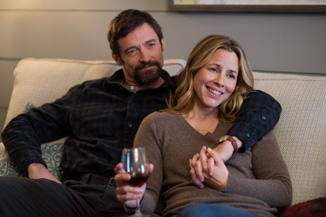Movie Review: Prisoners
By Matthew Huntley
September 25, 2013
BoxOfficeProphets.com

The setup is fairly routine, which is expected of any genre picture, but our hope is the ensuing events will be more original and involving. It’s a shame Prisoners is neither.
On a wet and dreary Thanksgiving in upstate New York, two families become devastated when their little girls go missing. Keller (Hugh Jackman) and Grace Dover (Maria Bello) are the parents of Anna (Erin Gerasimovich), while Joy (Kyla Drew Simmons) is the youngest daughter of Franklin (Terrence Howard) and Nancy Birch (Viola Davis). After dinner, Anna asks her mom if she can take Joy over to their house, which is just down the street. From this point on, they’re never seen or heard from again. The parents immediately call the police, while the Dover’s elder son, Ralph (Dylan Minnette), lets them know about a creaky and rusted motorhome that was parked randomly on the street.
This last tidbit of information draws suspicion and the motorhome is later spotted at a freeway gas station. Detective Loki (Jake Gyllenhaal), who was spending Thanksgiving alone in a Chinese restaurant, responds to the call and finds Alex (Paul Dano) cowering inside.
One of the movie’s first mistakes is the way it depicts the Alex character. It makes him a suspect by default simply because of the way he looks and behaves. He wears glasses with enlarged frames; has long, unruly hair; and can barely speak a complete sentence. After Detective Loki questions him, he tells the Dovers they’re dealing with a 20-something man who has the IQ of a 10-year-old. Of course we’re going to think of him in a guilty light.
Now I’m not saying child abductors can’t fit the description of Alex, but in the case of a Hollywood narrative, I can’t help but think Dano’s portrayal was just a cheap, easy ploy to make the audience believe he was the kidnapper. The rickety motorhome merely reinforces this, all in an effort to lead the audience down a certain path of thinking just so the movie can introduce a plot twist later on.
It turns out Alex’s motorhome has no physical evidence of a struggle or the girls being inside it, but despite these facts, Keller is convinced the kid had something to do with their disappearance. He’s so convinced, in fact, he’s willing to take extreme measures and break the law to prove it. What he does, I’ll not reveal, but he involves the Birches and his actions wind up shaking everyone’s moral fiber, illustrating the movie’s blatant message that tragedies are one way to flesh out peoples’ inner-most demons.
In the meantime, Detective Loki, who has an impeccable case record, interviews Alex’s Aunt Holly (Melissa Leo) but finds no legal reason to keep him locked up. His look into registered sex offenders, however, does lead to startling revelations and he has an unsettling hunch about another creepy individual named Bob (David Dastmalchian), who shows up to the girls’ candlelight vigil. There’s just something about the way this guy pets one of their stuffed animals that makes Loki want to chase after him.
Further discussion of the plot and I’d be giving too much away, not that Prisoners adds up to anything relevant. It’s one of those movies where everything that’s talked about plays some sort of role later on, which is annoying because nothing the characters say ends up feeling natural. All the dialogue and events are functional in some way, which is often inevitable for thrillers, but here it’s so obvious and manipulative, we feel like the movie is playing us rather than involving us.
It also employs several thriller and horror movie clichés, some of which are just silly, including the forceful, over-the-top father who yells and screams for the police to do something while his helpless wife stands idly by, crying and stuffing herself full of medication; or the dark, deep holes where people go venturing alone with only a flashlight as brooding music plays underneath; or ghastly animals that jump out of nowhere; and of course, the standard-issue red herring and element of doubt. All of these devices not only make us resentful toward Prisoners, but they make us question why it had to be so long. At nearly two and half hours, with its lack of introspection into its characters and subject matter, why does it take so much time to reach its conclusion?
There are a few good things to mention about the film, including its production design and art direction, which aren’t distinct in the classic sense, but they create a genuine working-class town with lived-in houses, old office buildings and rusted vehicles. I also admired Jake Gyllenhaal’s performance, which is real and unaffected; he’s able to make his character one of the few that doesn’t seem archetypal.
But aside from these few positives, as well as our curiosity about what actually happened to the girls, Prisoners isn’t all that engaging or surprising. What is surprising is that it was directed by Denis Villeneuve, who made the much richer and more effective Incendies, but here Aaron Guzikowski’s screenplay doesn’t give the filmmaker much to work with, and so we’re essentially left with a routine, uninspired thriller whose outward appearance tries to fool us into thinking it’s something more than that. It isn’t.